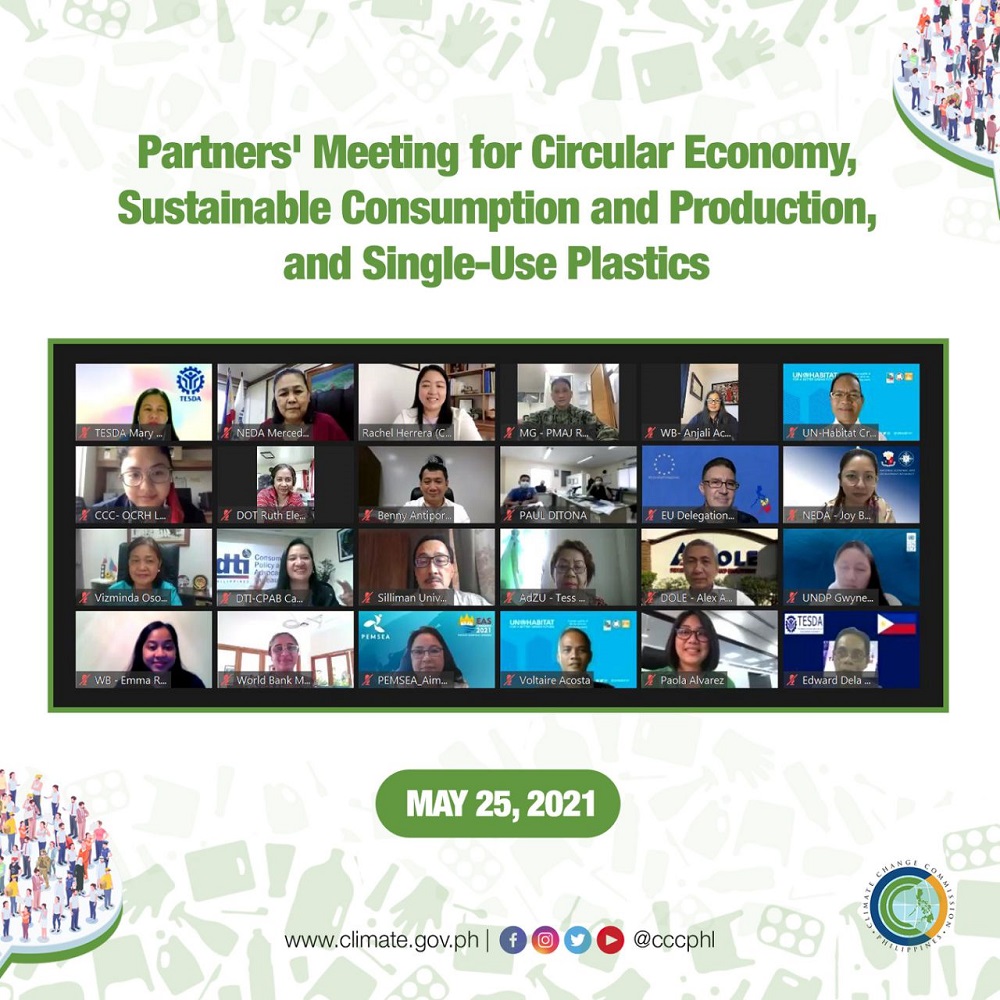
May 26, 2021 Wednesday

MANILA, 27 May 2021 — Leaders from the government, academic, and development sectors shared strategies and initiatives and explored ways of collaboration to promote circular economy, sustainable consumption and production, and address single-use plastics, in a meeting led by the Cabinet Cluster on Climate Change Adaptation and Mitigation and Disaster Risk Reduction (CCAM-DRR) and the World Bank Group.
Government agencies highlighted the importance of this dialogue with development partners, with Environment Undersecretary Analiza Rebuelta-Teh pointing to the circular economy to "provide an answer to our problem through reduce, reuse, recycle, and regenerate materials that will restore our environment” and Finance Assistant Secretary Paola Alvarez expressing the support of the Department of Finance to "the urgent passage of a measure regulating single-use plastics, as we recognize the necessity of eliminating plastic pollution for a more sustainable environment...By curbing the use of single-use plastics, every Filipino will do his/her part in helping save the country and the world's environment."
The World Bank, European Union Delegation to the Philippines, and the United Nations Human Settlement Programme (UN-Habitat) meanwhile presented their initiatives and expressed their commitment to help the Philippines and other countries in advancing policies, projects, and programs that would promote circularity and sustainability.
Ms. Madhu Raghunath, the World Bank Group’s Sector Leader for Sustainable Development for Brunei, Malaysia, Philippines, and Thailand, said that “the ASEAN region accounts for about 20% of the global plastic production, which is expected to grow given its economic growth, rapid urbanization, and changing consumption and production practices." Mr. Christopher Rollo, Country Programme Manager of the UN-Habitat Philippines, also stressed the transformative role that cities play in achieving sustainable development goals.
Mr. Giovanni Serritella, EU Delegation to the Philippines’ Programme Manager for Environment and Climate Change Development Cooperation, shared action items for the transition to circular economy as a top policy priority for the EU. "In the EU, we are against the unsustainable use of plastic––particularly, single-use plastics––because of the significant carbon footprint it carries due to plastic production. Plastic manufacturing approximately contributes to 8% of yearly oil production, and continuing on the yearly trend, by 2050, we will be at 10-20% if things don't change. That translates into contribution of about 100-500 million tons of CO2 emitted every year," Serritella said.
Undersecretary Mercedita Sombilla of the National Economic and Development Authority (NEDA) presented the Philippine Action on Plan for Sustainable Consumption and Production (PAP4SCP) and the needed priority actions, such as extending responsibility of plastic producers for take-back, collection and recycling, the expansion of market-based instruments, setting up of “green informatics,” and strengthening green public procurement to operationalize the plan. Assistant Director Vizminda Osorio of the Department of Environment and Natural Resources (DENR)-Environmental Management Bureau also presented on the National Plan of Action on Marine Litter and the strategies to build partnerships and synergies at the local level.
Assistant Director Marie Camille Castillo of the Department of Trade and Industry (DTI) also committed that they will continue to develop Philippine National Standards on Circular Economy and Sustainable Consumption and Production, as well as further implement the National Eco-Labeling Program - Green Choice Philippines (NELP-GCP).
House Committee on Ecology Secretary Atty. Dilbert Quetulio presented House Bill 9147 or the Single-Use Plastics Regulation Bill, which seeks the phaseout of single-use plastics starting with the most problematic types, and establishing the extended producers responsibility scheme. “The committee tried to balance the economic, societal, and environmental implications of the bill," Quetulio said.
The agencies and organizations present vowed to continue working together on policies and measures, including the formulation of a national roadmap towards zero single-use plastics and in identifying more partners to promote circular economy and sustainability principles and practices, with Climate Change Commissioner Rachel Herrera emphasizing how a whole-of-society approach is critical to ensure success, taking into consideration institutional capacities at the local level for implementation and the socio-economic impact of the proposed policies and regulations.
In his closing message, DENR Undersecretary Benny D. Antiporda expressed, "From this introductory meeting, we will now be moving forward. We know that the transition cannot be made overnight, but by building consensus, partnerships, and momentum, we should expect good results within a reasonable period.”